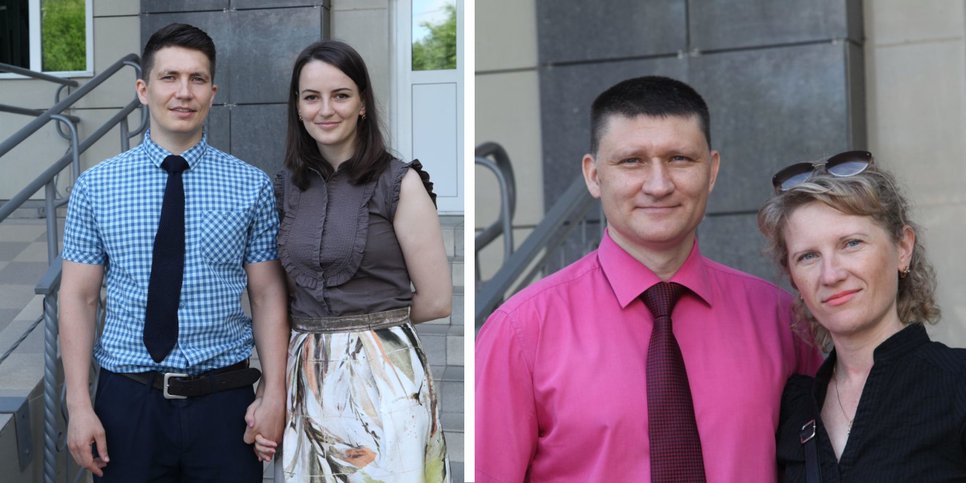In the photo: Dmitry Golik and Alexei Berchuk with their wives near the courthouse
In the photo: Dmitry Golik and Alexei Berchuk with their wives near the courthouse
An Appeal in Blagoveshchensk Upholds a Record Harsh Sentence to Alexey Berchuk and Reduces the Prison Term for Dmitriy Golik
Amur RegionOn September 2, 2021, the Amur Regional Court satisfied the believers' appeal only partially: 34-year-old Dmitriy Golik’s sentense was reduced by 10 months, and the sentence to 45-year-old Alexey Berchuk — 8 years in a general regime colony — was left unchanged.
The court excluded from the sentence to Dmitriy Golik the charge of involvement in the activities of an extremist organization, leaving the charge of organizing the activities of an extremist organization (part 1 of article 282.2 of the Criminal Code of the Russian Federation). The believer was sentenced to imprisonment for a period of 6 years and 2 months, followed by restriction of freedom for 1 year and 2 months. The rest of the decision of the first instance court was left unchanged. The verdict entered into force. Berchuk and Golik still insist on their innocence. They have the right to appeal against the verdict in cassation procedure, as well as in international instances.
On June 30, 2021, Tatyana Studilko, judge of the Blagoveshchensk City Court of the Amur Region, handed down a record cruel sentence to Berchuk and Golik — 8 and 7 years in prison — for discussing Bible teachings with friends. This is the exact timeframe the prosecutor requested for believers.
In his youth, Dmitriy Golik already had to defend his peaceful Christian convictions: he did alternative civilian service instead of military, working as a nurse in a nursing home. Now the believer defended his good name in court, since the authorities ranked him as an extremist only because of his faith in Jehovah God.
In January 2019, Alexey Berchuk was detained at a Moscow airport while going through passport control. During the arrest, all his money was taken away, so Alexey was very worried about his wife, since she was left without a livelihood.
The court of first instance considered the case of Berchuk and Golik for over a year. All this time they were supported by co-religionists — they wrote letters and provided practical assistance. For example, they provided housing to the Berchuk family free of charge when they urgently needed it.
Believers, despite persecution, try to notice the positive moments in their lives. Although they were deprived of the opportunity to leave their place of residence without the permission of the investigator, in the summer of 2019, with his consent, they were able to go on a short vacation. Aleksey Berchuk also told how one day, being in a cell, he asked a police officer to bring him “to read something encouraging”. Refusing at the beginning, he nevertheless brought the Psalter and the New Testament.
After Dmitry and Alexei were convicted, Golik's wife, Christina, and 3 other religious women became involved in a new criminal case. By the end of August 2021, 20 Jehovah's Witnesses had already been prosecuted for their faith in the Amur Region. Four of them, including Berchuk and Golik, were convicted.
Dmitriy Golik in the court of first instance explained the groundlessness of the persecution of Jehovah's Witnesses in Russia: “At certain periods, God's servants were sometimes called heretics, sometimes misanthropists, or enemies of the state. Today they use a new term — "extremist". They interpret it rather vaguely. But the goal is one — to silence these ministers, to stop talking about God. The purpose of this criminal prosecution is to silence me, to scare others, so that they would stop practicing their faith, as they professed it before. "
“The verdict against Berchuk and Golik is an example of the unscrupulousness and inhumanity of some judges. They ruin lives by imprisoning those who in many countries are held up as examples of good citizens,— Yaroslav Sivulskiy, a representative of the European Association of Jehovah's Witnesses, commented on the court’s decision.— Most accusations: for reading the Bible and talking with others about God. In 1991, the state recognized that the Witnesses were peaceful people, and that what happened to them was ideological repression. The believers were rehabilitated, they were paid compensation. The Russian authorities still claim that the faith of Jehovah's Witnesses is not prohibited. The judges in Blagoveshchensk put themselves and the entire state in a stupid position. "
The Memorial Human Rights Center expressed its opinion on the persecution of believers in Russia: “We consider the declaration of Jehovah's Witnesses as extremist and unfounded, violating the rights to freedom of conscience and association, and the criminal prosecution of followers of this peaceful belief is illegal and discriminatory.” Human rights activists demand an end to the persecution of Jehovah's Witnesses based on their religious affiliation.


